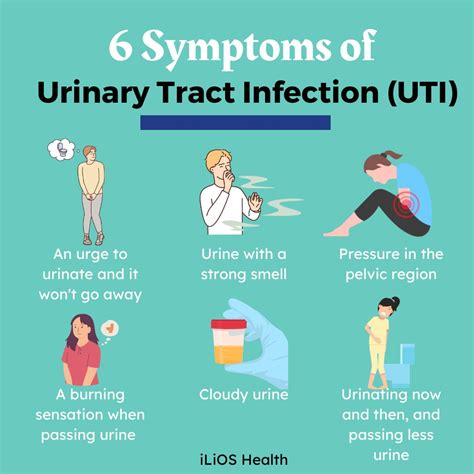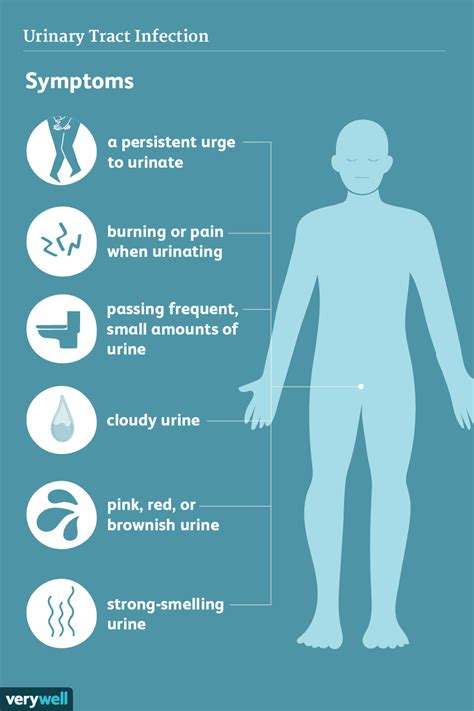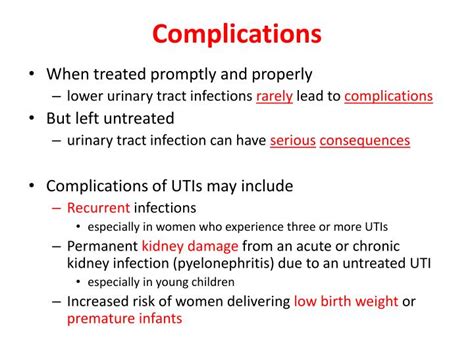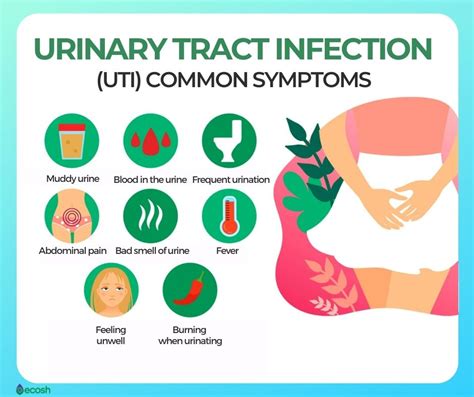Intro
Discover 5 UTI symptoms, including burning sensations, frequent urination, and abdominal pain, to identify urinary tract infections and seek timely treatment for bladder health and prevention of kidney damage.
Urinary tract infections, commonly referred to as UTIs, are a prevalent health issue affecting millions of people worldwide. The symptoms of UTIs can vary significantly from one person to another, but there are certain common signs that indicate the presence of an infection. Understanding these symptoms is crucial for early diagnosis and treatment, which can help prevent the infection from spreading and causing more severe complications.
UTIs occur when bacteria, fungi, or viruses enter the urinary system, which includes the kidneys, ureters, bladder, and urethra. Women are more prone to UTIs due to their shorter urethra, which allows bacteria easier access to the bladder. However, men can also develop UTIs, especially as they age. The symptoms of UTIs can range from mild to severe and can significantly impact an individual's quality of life.
Recognizing the symptoms of UTIs is the first step towards seeking medical attention. Some of the most common symptoms include a burning sensation while urinating, frequent urination, and abdominal pain. These symptoms can be uncomfortable and may disrupt daily activities. Moreover, if left untreated, UTIs can lead to more serious health issues, such as kidney damage or sepsis, a potentially life-threatening condition. Therefore, it is essential to be aware of the signs of UTIs and to consult a healthcare provider if symptoms persist or worsen over time.
Understanding UTI Symptoms

UTI symptoms can be categorized based on the part of the urinary system that is affected. Lower urinary tract infections, which involve the bladder and urethra, are the most common type of UTI. Symptoms of lower UTIs include dysuria (a burning sensation while urinating), increased frequency of urination, and nocturia (waking up during the night to urinate). Additionally, individuals may experience pain or discomfort in the pelvic area or urethra.
Types of UTI Symptoms
Upper urinary tract infections, which affect the kidneys, can present with more severe symptoms, including flank pain, high fever, and chills. In severe cases, individuals may experience nausea, vomiting, and blood in the urine. It is crucial to seek immediate medical attention if symptoms of an upper UTI are present, as untreated infections can lead to permanent kidney damage.Common UTI Symptoms in Women

Women are more likely to experience UTIs due to their anatomy. The shorter length of the female urethra allows bacteria to reach the bladder more easily, leading to infections. Common symptoms of UTIs in women include a strong urge to urinate, even when the bladder is not full, and a burning sensation during urination. Women may also experience pelvic pain or pressure and cloudy or strong-smelling urine.
Diagnosing UTIs in Women
Diagnosing UTIs in women typically involves a physical examination, medical history, and laboratory tests. A healthcare provider may perform a urinalysis to check for the presence of bacteria, blood, or other abnormalities in the urine. In some cases, a urine culture may be ordered to identify the type of bacteria causing the infection and to determine the most effective treatment.UTI Symptoms in Men

While less common, men can also develop UTIs. The symptoms in men are similar to those in women and may include dysuria, frequent urination, and abdominal pain. However, men are more likely to experience symptoms related to the prostate, such as pain or discomfort in the penis, testicles, or scrotum. Men over the age of 50 are at a higher risk of developing UTIs due to prostate enlargement, which can obstruct the flow of urine and increase the risk of bacterial infection.
Treatment Options for UTIs in Men
Treatment for UTIs in men typically involves antibiotics, which are prescribed based on the type of bacteria causing the infection. It is essential for men to complete the full course of antibiotics, even if symptoms improve before finishing the medication, to ensure that the infection is fully cleared. In some cases, men may require additional treatments, such as alpha-blockers to relax the muscles in the prostate and bladder neck, making it easier to urinate.Complications of Untreated UTIs

Untreated UTIs can lead to severe complications, including kidney damage, sepsis, and even death. It is crucial to seek medical attention if symptoms of a UTI are present, especially if they worsen over time or are accompanied by fever, chills, or vomiting. Prompt treatment can help prevent long-term damage to the urinary system and reduce the risk of complications.
Preventing UTIs
Preventing UTIs involves practicing good hygiene, staying hydrated, and urinating when the need arises. Individuals should avoid holding in urine for extended periods, as this can increase the risk of bacterial growth. Wiping from front to back after using the bathroom can also help prevent bacteria from entering the urethra. Drinking cranberry juice or taking cranberry supplements may help prevent UTIs, although the evidence for this is mixed.Home Remedies for UTIs

While antibiotics are the primary treatment for UTIs, there are several home remedies that may help alleviate symptoms. Drinking plenty of water can help flush out bacteria from the urinary system. Applying heat to the lower abdomen may help relieve discomfort and pain. Urinary tract analgesics, such as phenazopyridine, can help reduce the burning sensation during urination.
Natural Remedies for UTIs
Some natural remedies, such as uva ursi, juniper berries, and parsley, have been suggested to help treat UTIs. However, the effectiveness of these remedies is not well established, and individuals should consult with a healthcare provider before using them. Probiotics may also help maintain a healthy balance of bacteria in the urinary system, reducing the risk of infection.UTI Treatment Options

Treatment for UTIs typically involves antibiotics, which are prescribed based on the type of bacteria causing the infection. The duration of treatment depends on the severity of the infection and the individual's overall health. In some cases, individuals may require hospitalization if the infection is severe or if they are at risk of developing complications.
Recurrent UTIs
Individuals who experience recurrent UTIs may require additional treatments, such as low-dose antibiotics for an extended period. In some cases, individuals may need to take antibiotics after sexual intercourse to prevent UTIs. Women may also benefit from using topical estrogen therapy to reduce the risk of recurrent UTIs.Living with UTIs

Living with UTIs can be challenging, but there are several steps individuals can take to manage their symptoms and prevent recurrent infections. Practicing good hygiene, staying hydrated, and avoiding certain foods that can irritate the bladder can help reduce the risk of UTIs. Individuals should also seek medical attention if symptoms persist or worsen over time.
Coping with UTI Symptoms
Coping with UTI symptoms requires a comprehensive approach that involves medical treatment, lifestyle changes, and stress management. Individuals can benefit from keeping a symptom journal to track their symptoms and identify potential triggers. Practicing relaxation techniques, such as deep breathing or meditation, can also help reduce stress and alleviate symptoms.What are the most common symptoms of UTIs?
+The most common symptoms of UTIs include a burning sensation while urinating, frequent urination, and abdominal pain. Individuals may also experience cloudy or strong-smelling urine, and in severe cases, fever, chills, and nausea.
How are UTIs diagnosed?
+UTIs are typically diagnosed through a physical examination, medical history, and laboratory tests, such as urinalysis and urine culture. A healthcare provider may also perform imaging tests, such as ultrasound or CT scans, to rule out other conditions.
Can UTIs be prevented?
+Yes, UTIs can be prevented by practicing good hygiene, staying hydrated, and avoiding certain foods that can irritate the bladder. Individuals should also urinate when the need arises and avoid holding in urine for extended periods.
What are the complications of untreated UTIs?
+Untreated UTIs can lead to severe complications, including kidney damage, sepsis, and even death. It is essential to seek medical attention if symptoms of a UTI are present, especially if they worsen over time or are accompanied by fever, chills, or vomiting.
How can I manage UTI symptoms?
+Managing UTI symptoms requires a comprehensive approach that involves medical treatment, lifestyle changes, and stress management. Individuals can benefit from practicing good hygiene, staying hydrated, and avoiding certain foods that can irritate the bladder. They should also seek medical attention if symptoms persist or worsen over time.
In summary, UTIs are a common health issue that can significantly impact an individual's quality of life. Understanding the symptoms of UTIs, seeking medical attention, and practicing prevention strategies can help reduce the risk of complications and improve overall health. If you have experienced UTI symptoms or have concerns about your urinary health, we encourage you to share your thoughts and questions in the comments below. Additionally, if you found this article informative, please consider sharing it with others who may benefit from this information. By working together, we can raise awareness about UTIs and promote better urinary health for everyone.
